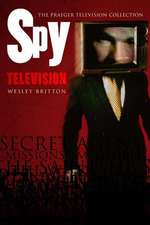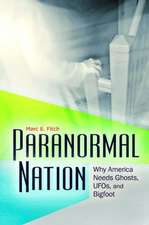Beyond Bond: Spies in Fiction and Film
Autor Wesley Brittonen Limba Engleză Hardback – 29 iun 2005 – vârsta până la 17 ani
Preț: 357.81 lei
Preț vechi: 416.29 lei
-14% Nou
Puncte Express: 537
Preț estimativ în valută:
68.50€ • 70.45$ • 56.83£
68.50€ • 70.45$ • 56.83£
Carte tipărită la comandă
Livrare economică 20 februarie-06 martie
Preluare comenzi: 021 569.72.76
Specificații
ISBN-13: 9780275985561
ISBN-10: 0275985563
Pagini: 300
Dimensiuni: 156 x 235 x 26 mm
Greutate: 0.61 kg
Ediția:New.
Editura: Bloomsbury Publishing
Colecția Praeger
Locul publicării:New York, United States
ISBN-10: 0275985563
Pagini: 300
Dimensiuni: 156 x 235 x 26 mm
Greutate: 0.61 kg
Ediția:New.
Editura: Bloomsbury Publishing
Colecția Praeger
Locul publicării:New York, United States
Notă biografică
Wesley Britton is the author of Spy Television (Praeger, 2004), the first book-length study of espionage television series. He is also the author of several articles for journals, encyclopedias, and periodicals, as well as book reviews and poetry.
Cuprins
Preface and AcknowledgementsTHE 39 STEPS: Creating a GenreMaugham, Ambler, and Greene: The Loss of InnocenceOn the Air, on the Screen, and in Word-Balloons: Heroes on Radio and Film before the Cold WarMcCarthy, Television, and Film Noir: the Russians Arrive"Cloak and Swagger": James Bond and The Spy Renaissance in the 1960sFrom George Smiley to Bernard Sampson: The Counter-Fleming MovementThe Cold War Inside Out: "Whose side are you on?"From the Evil Empire to The Great Satan: Spying in the Reagan YearsBig Screen Pyrotechnics and Eyes in the Sky: Spies in a Technological WorldConclusionMore Fact than Fiction: Espionage After 9/11Chapter NotesWorks CitedPreface and Acknowledgements
Recenzii
Given the recent complications in intelligence-gathering and interpretation, perhaps some in that discipline should take time for a review of how the professionals do it, at least on a soundstage or in paperback. Britton examines the genres within the genres, especially those that rose and fell in response to the events of the time, beginning with such classics as foundational The 39 Steps and the loss of innocence in Maugham, Ambler and Greene. He describes the prelude to the Cold War in the personae of spy heroes on the radio and print and the influence of McCarthyism on television spies, works through the rich pickings of the Reagan years and the influx of action and explosions in recent techno-thrillers. In his conclusion, Britton describes what 9/11 has wrought in the genre, and why even the most casual viewers and readers are paying more attention.












